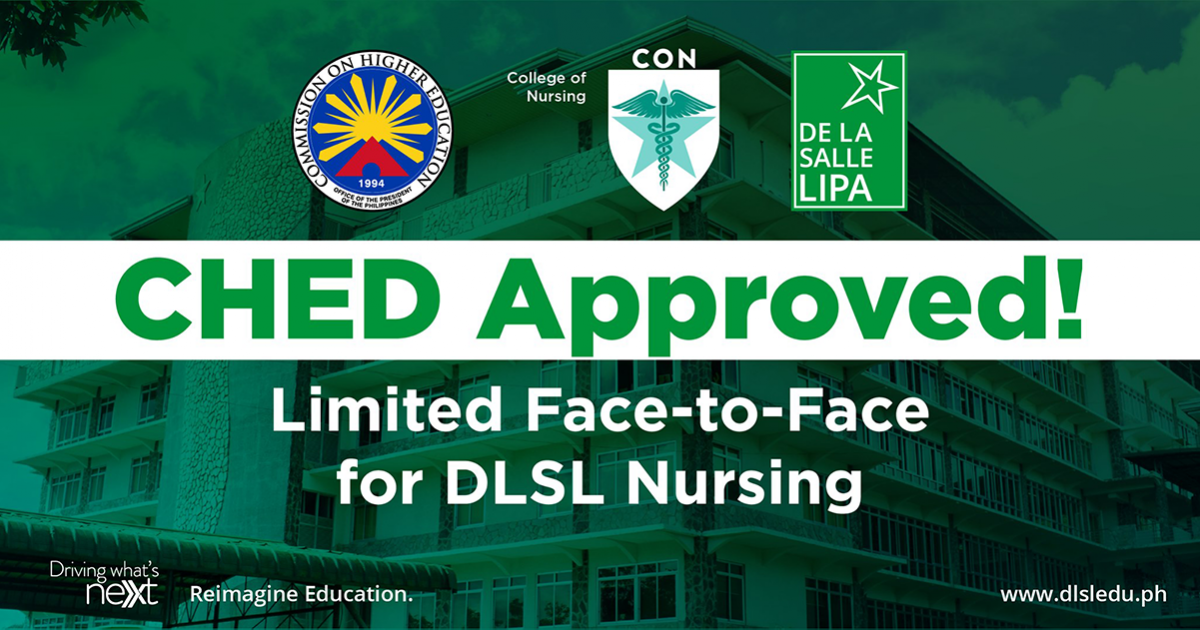
Pursuant to the granting of the Certificate of Authority (COA) to operate last Oct.14, De La Salle Lipa (DLSL) College of Nursing (CON) geared up for campus reopening to accommodate third and fourth-year students through limited face-to-face classes next semester, as announced on the department’s Facebook page, Oct. 30.

As early as April, Margie Ebreo, dean of CON, stated that DLSL had been preparing for limited face-to-face classes to impose protocols that address students’ and parents’ safety concerns.
However, the supposed conduct of physical classes in November is moved to January or February of the following year due to time constraints and delayed visitations from the Commission on Higher Education (CHED) caused by the influx of COVID cases.
Meanwhile, among the protocols included for the physical classes are the installation of signages, wash tents, acrylic shields on classroom tables, isolation facilities for individuals manifesting COVID-like symptoms during their stay in DLSL, and the strict observance of physical distance in and out of the classroom with a minimum of two meters between each individual.
The department will also require participating students to have vaccination IDs and an active PhilHealth membership, while those who opt to refrain from attending limited face-to-face classes are given the option to file a Leave of Absence (LOA).
“When the student decides to enroll, he or she is required […] to engage in the limited face-to-face. In the event that the student opted not to engage in the limited face-to-face, then the student has the prerogative not to enroll,” Ebreo explained.
In compliance with the guidelines set by the CHED, Ebreo also stated that the limited face-to-face classes would adopt the 4-10 cyclical student shifting model, wherein students will have four days of physical academic engagement followed by ten days quarantine to minimize the risks of virus transmission.

Upon implementation, the department will focus on Related Learning Experience (RLE) courses to review nursing concepts and skills and immersion through hospital exposure in DLSL’s affiliated hospital, Mary Mediatrix Medical Center.
The department also opts to maximize nursing students’ hospital immersion by selecting COVID-free areas such as the operating room, delivery ward, surgical ward, dialysis area, Cardiac Catheterization Laboratory (CATH Lab), and the heart station.
Moreover, Ebreo also highlighted the importance of experiencing bedside care and operating room management.
“Nursing is a highly skilled profession [na] kailangan talaga hands-on sila [at] nagha-handle ng cases because you cannot just go to the hospital duty and tend or care for your patient based on theory alone,” said Ebreo.
Maria Seth Burias, CON Governor, expressed the same opinion regarding the conduct of physical classes.
“Iba talaga kapag may clinical experience [at] nandoon ka sa mismong setting compared doon sa nag-improve lang tayo ng materials natin for that demonstration,” said Burias.

On the other hand, following the announcement of campus reopening, fourth-year students raised their concerns, particularly on the expenses for their requirements such as swab testing and vaccines, rent for dormitories, transportation, and the risks of contracting COVID-19.
“Based on the last update of our college, we will be required to undergo swab testing before every rotation of the class [and] that is too costly for the 4-10 scheme,” said Rain Ino.
Meanwhile, for Rebekah Maderazo, the continuous rise of COVID cases and the presence of various variants in the country is a threat that must be considered before opening classes.
“Other than that, I would also consider personal challenges [or] capabilities such as financial capacity, dormitories, [the] safety of family members, transportation, and inconsistent guidelines from the government,” Maderazo said.
In response to this, the CON Student Government (SG) ensures that they are consistently coordinating with the faculty and the department chairs to assist students in the conduct of limited face-to-face classes.
“Rest assured that we are here for them—for any assistance that they will be needing [and] we are very much looking forward dito sa aming limited face-to-face classes,” said Burias.